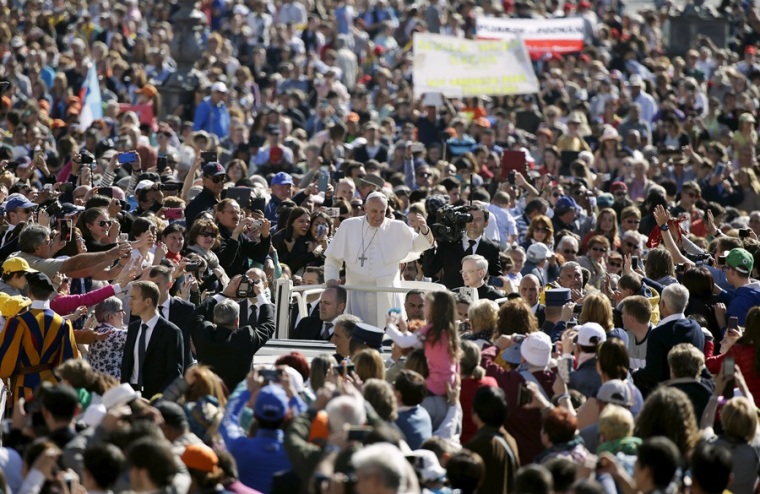Al-Qaeda Suspects Arrested in Foiled Plot to Attack Vatican, Targeting Pope Francis

Ten people were arrested on Friday by the Italian police on suspicion of plotting an attack on the Vatican targeting Pope Francis himself. The police were still on a manhunt for eight others who are also suspected of belonging to an armed group linked to al-Qaeda who had earlier also plotted attacks in Pakistan and Afghanistan.
Some of the suspects, who are either Pakistanis or Afghans, were arrested in early morning raids across Italy. Police officers barged into the home of the group's suspected spiritual leader, in the northern city of Bergamo, a police video showed.
Though the 18 suspects were suspected of plotting attacks mainly in their native countries, phone taps made by the Italian police suggested the Vatican was also their target, said Mauro Mura, chief prosecutor of the Sardinian city of Cagliari, where the group is based.
Mura said the group planned an attack on the Vatican in 2010. Although this did not happen, the group continued to operate across Italy after that, he said.
He said the group considered a suicide attack in a crowded place in the Vatican, presumably St. Peter's Square. Italian officials have for years feared such a possible attack by militants and have increased security there.
Mura said the group had a large number of weapons and many followers that were willing to launch terrorist attacks.
In the suspects' conversations tapped by the police, the suspects discuss "a big jihad in Italy," said Mario Carta, head of the police unit on the case. They uttered the word "baba," which could mean the pope, Carta said.
"We don't have proof, we have strong suspicion," that Pope Francis was a possible target, he said at a press conference.
The group, authorities said, supported "armed struggle against the West" and wanted to destabilize the Pakistani government, which is backing U.S. forces in Afghanistan.
The group sent 55,268 euros ($60,160) to Pakistan carried by someone on a flight from Rome to Islamabad.
Vatican spokesman Federico Lombardi said the alleged attack plots were in the past, and that the new developments were not a matter for concern.
However, Vatican Secretary of State Cardinal Pietro Parolin admitted: "We are all afraid because we don't know what can happen."
Italy, just like other European countries, has been on heightened alert for possible terrorist operations following the January attack on French satirical magazine Charlie Hebdo in Paris.
European governments have expressed concern about possible "sleeper" militant cells whose members live normal lives in their countries, adding that they may at some point in the future be activated to launch attacks.
 Christians don't have to affirm transgenderism, but they can’t express that view at work: tribunal
Christians don't have to affirm transgenderism, but they can’t express that view at work: tribunal Archaeology discovery: Medieval Christian prayer beads found on Holy Island
Archaeology discovery: Medieval Christian prayer beads found on Holy Island Presbyterian Church in America votes to leave National Association of Evangelicals
Presbyterian Church in America votes to leave National Association of Evangelicals Over 50 killed in 'vile and satanic' attack at Nigerian church on Pentecost Sunday
Over 50 killed in 'vile and satanic' attack at Nigerian church on Pentecost Sunday Ukrainian Orthodox Church severs ties with Moscow over Patriarch Kirill's support for Putin's war
Ukrainian Orthodox Church severs ties with Moscow over Patriarch Kirill's support for Putin's war Islamic State kills 20 Nigerian Christians as revenge for US airstrike
Islamic State kills 20 Nigerian Christians as revenge for US airstrike Man who served 33 years in prison for murder leads inmates to Christ
Man who served 33 years in prison for murder leads inmates to Christ


 Nigerian student beaten to death, body burned over ‘blasphemous’ WhatsApp message
Nigerian student beaten to death, body burned over ‘blasphemous’ WhatsApp message 'A new low': World reacts after Hong Kong arrests 90-year-old Cardinal Joseph Zen
'A new low': World reacts after Hong Kong arrests 90-year-old Cardinal Joseph Zen Iran sentences Christian man to 10 years in prison for hosting house church worship gathering
Iran sentences Christian man to 10 years in prison for hosting house church worship gathering French Guyana: Pastor shot dead, church set on fire after meeting delegation of Evangelicals
French Guyana: Pastor shot dead, church set on fire after meeting delegation of Evangelicals ‘Talking Jesus’ report finds only 6% of UK adults identify as practicing Christians
‘Talking Jesus’ report finds only 6% of UK adults identify as practicing Christians Mission Eurasia ministry center blown up in Ukraine, hundreds of Bibles destroyed: 'God will provide'
Mission Eurasia ministry center blown up in Ukraine, hundreds of Bibles destroyed: 'God will provide' Church holds service for first time after ISIS desecrated it 8 years ago
Church holds service for first time after ISIS desecrated it 8 years ago Burger King apologizes for 'offensive campaign' using Jesus' words at the Last Supper
Burger King apologizes for 'offensive campaign' using Jesus' words at the Last Supper Uganda: Muslims abduct teacher, burn him inside mosque for praying in Christ’s name
Uganda: Muslims abduct teacher, burn him inside mosque for praying in Christ’s name